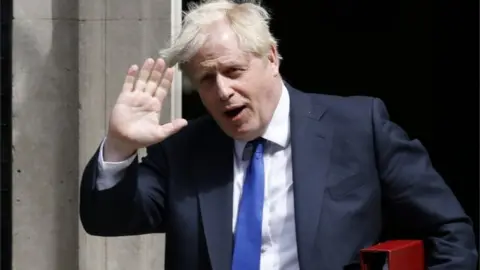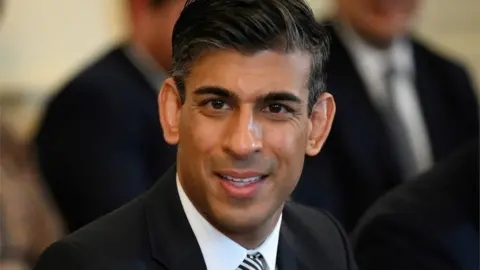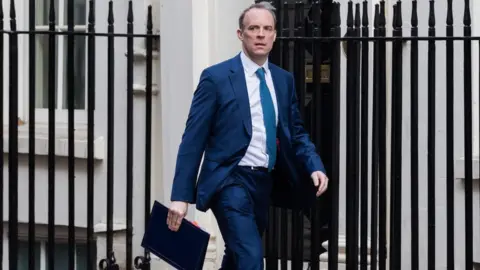Boris Johnson: The backstory to the PM's dramatic resignation
Boris Johnson is to resign as UK prime minister after he was hit by an unprecedented wave of resignations from his government.
Months of unremitting political turbulence spiked on Tuesday when his health secretary and chancellor quit within 10 minutes of each other over the PM's handling of sexual misconduct allegations against a senior MP.
This triggered a trickle of resignations and letters of no confidence from junior ministers and MPs that on Wednesday became a flood. That evening, a group of senior ministers went to Downing Street to try to persuade the PM to resign.
Mr Johnson initially remained defiant and on Wednesday evening said he had no intention of resigning given his "colossal mandate" from voters at the 2019 election. Cabinet ally Jacob Rees-Mogg dismissed the campaign against him as a "squall".
But by Thursday morning more than 50 members of the government had quit, including Education Secretary Michelle Donelan who had only been appointed on Tuesday night. and Mr Johnson was forced to bow to the inevitable.
In a short statement, the opposition leader Sir Keir Starmer wrote that Mr Johnson's resignation "is good news for the country" and said he was "responsible for lies, scandal and fraud on an industrial scale".
So how did we get here?
A drunken night out in Westminster
Last Thursday Noa Hoffman, a 24-year-old just four days into her job as a political reporter for the Sun newspaper, broke the news that a Conservative MP had resigned from his role as a party whip following a boozy evening at the Carlton private members club.
In his resignation letter, Chris Pincher told the PM he "drank far too much" and "embarrassed myself and other people".
But the matter turned out to be far more serious: he is alleged to have grabbed two men at a private members' club, touching at least one of them on the groin.
Two things then happened. The government briefed the media that Mr Pincher had recognised he had behaved badly and so would keep his job as an MP and face no further action.
But behind the scenes Conservative MPs were furious.
Similar allegations of sexual misconduct had been made against Mr Pincher in the past. Yet Mr Johnson had put him into a position of power as the party's deputy chief whip - enforcers who ensure MP discipline but who are also responsible for pastoral matters.
 EPA
EPAHow the official line changed
The story then became about what Boris Johnson knew about Mr Pincher and when he knew it.
For days ministers and Mr Johnson's spokesman insisted the prime minister had not been aware of specific allegations against Mr Pincher when appointing him deputy chief whip.
On Monday night that story collapsed when BBC political correspondent Ione Wells revealed that Mr Johnson had in fact been made aware of a formal complaint about "inappropriate behaviour" by Mr Pincher when he was a Foreign Office minister from 2019-20.
Tuesday saw a dramatic public intervention by the former top Foreign Office civil servant Sir Simon McDonald, who said Mr Johnson had been briefed in person about the complaint.
Downing Street then told journalists that Mr Johnson had in fact known - but had "forgotten".
Allow X content?

On Tuesday Mr Johnson admitted it had been a "bad mistake" to appoint Mr Pincher.
But the damage was done.
Bombshell resignations
The discontent erupted when Chancellor Rishi Sunak - responsible for the economy - and Health Secretary Sajid Javid quit.
In his letter Mr Sunak said the public "rightly expect government to be conducted properly, competently and seriously".
In a subsequent statement to Parliament on Wednesday Mr Javid said - with Mr Johnson looking on - that the problem "starts at the top" and "that's not going to change".
 Reuters
ReutersTuesday afternoon saw Mr Johnson call the rest of his cabinet to find out who was staying and who was going - so far the rest of the cabinet has remained loyal.
A frosty reception from MPs
On Wednesday Mr Johnson appeared before MPs in the House of Commons determined to ride out the storm.
Asked by a Conservative MP if there were any circumstances under which he would resign - he replied that he would "hang on in there".
"Frankly, the job of a prime minister in difficult circumstances when you have been handed a colossal mandate is to keep going and that's what I'm going to do," he said, referring to his landslide 2019 general election win.
But the BBC's Chris Mason said you could feel, hear and smell the authority draining away from Boris Johnson and his exit from Parliament was greeted by opposition Labour MPs jeering "bye bye".
Several cabinet ministers, including Home Secretary Priti Patel and Chancellor Nadhim Zahawi, appointed on Tuesday to replace Mr Sunak, were among senior figures who later met Mr Johnson and urged him to step down.
What happens now?
 Getty Images
Getty ImagesSome Conservative MPs have called on Mr Johnson to leave office immediately and to appoint Dominic Raab, the deputy prime minister, as caretaker.
Dominic Cummings, formerly chief advisor to Mr Johnson, wrote on Twitter that the prime minister will cause "carnage" if he remains in office and claimed that "even now he's playing for time & will try to stay".
Mr Johnson is believed to have told the Queen that he will remain at 10 Downing Street as interim prime minister until the Conservative Party elects a new leader, which could come as late as the party's conference in October.
But ultimately the decision rests with a powerful group of backbench Conservative MPs, called the 1922 committee, who will set the rules and timetable for the leadership contest.
Several members of the outgoing government are expected to stand in the race, including Foreign Secretary Liz Truss, Chancellor Nadhim Zahawi and Trade Minister Penny Mordaunt.
Some critics of the current government, such as foreign affairs committee chair Tom Tugendhat and former Foreign Secretary Jeremy Hunt, are also expected to stand.
Both Tory MPs and ordinary members have a role to play in the process. MPs will narrow the field down to just two candidates through a multi-stage ballot before members vote on a shortlist of just two candidates. The winner will be invited by the Queen to become Prime Minister and to form a new government.
